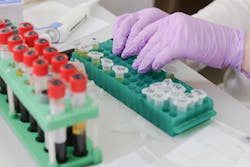Illumina receives first EUA for a sequencing-based COVID-19 diagnostic test
The U.S. Food and Drug Administration (FDA) issued an Emergency Use Authorization (EUA) for the Illumina COVIDSeq test, a high-throughput, sequencing-based, in vitro diagnostic (IVD) workflow enabling the detection of SARS-CoV-2. The end-to-end workflow extends the options available for labs to scale diagnostic testing.
COVIDSeq uses upper respiratory specimens, including a nasopharyngeal or oropharyngeal swab, and delivers sample receipt to result in 24 hours using the NovaSeq 6000 Sequencing System. The differentiated diagnostic design includes 98 amplicons that target the full SARS-CoV-2 genome, creating accurate detection and high sensitivity. COVIDSeq is currently available to a limited number of early access sites and is expected to be more broadly available this summer.
The workflow accommodates up to 3,072 samples per NovaSeq run leveraging the S4 flow cell, and includes steps for viral RNA extraction, RNA-to-CDNA conversion, PCR, library preparation, sequencing and report generation. The key components leveraged include the NovaSeq 6000, coupled with Illumina Tagmentation library preparation technology, and the DRAGEN COVIDSeq Test Pipeline for rapid reporting.
COVIDSeq has not been FDA cleared or approved. This test is authorized by FDA under an EUA for the duration of the declaration that circumstances exist justifying the authorization of emergency use of in vitro diagnostics for detection and/or diagnosis of COVID-19. COVIDSeq is only authorized for use in laboratories in the U.S, certified under the Clinical Laboratory Improvement Amendments of 1988 (CLIA), 42 U.S.C. §263a, to perform moderate and high complexity tests. Outside the U.S., COVIDSeq will be labeled either as Research Use Only (RUO), or with labeling aligned with local regulations.

